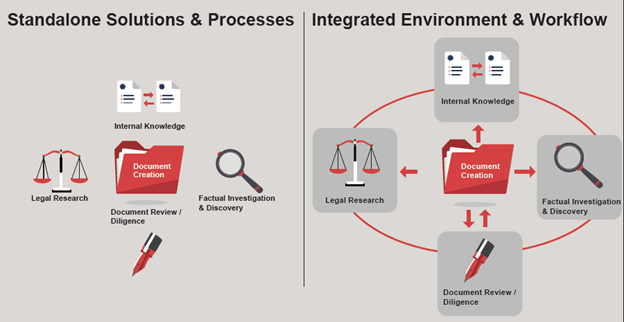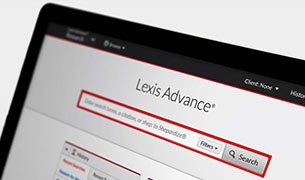Evolution of the Attorney Workflow Process
Analyst insight from Blue Hill Research identifies opportunities to improve legal research and drafting by automating core legal processes with Lexis® for Microsoft® Office.
Evolution of Attorney Workflow—Straight from the Analysts
David Houlihan, principal analyst at Blue Hill Research, recently published an “Analyst Insight” report that chronicled the history of attorney workflow and then identified the emergence of new attorney workspace solutions.
In the report, Houlihan notes that legal analysis, advice and advocacy represent complex information management and application tasks, each requiring a diverse array of data inputs, including legal authorities, factual information, and observed experience and best practices.
For example, electronic legal research databases replaced large-volume compilations of law. Word processors replaced paper and dictation-and-typist dynamics. Internal knowledge became captured in documents or centralized in knowledge management systems.
Attorneys are accustomed to a certain set of workspaces, mostly Microsoft Office environments. Solutions that use Microsoft Office as a platform make a lot of sense. Word and Outlook® become the familiar place to present workflow and data, while managing technical aspects in the background. That creates a better path and a smart way to go about supporting legal processes.
Legal Operations Manager, Medical Technology Provider
The legal workspace has undergone quite an evolution over the past 60+ years. For decades, legal professionals relied on huge print volumes for research and generated file cabinets full of printed documents from their client matters. With the rise of electronic tools in the 1970s and 1980s, these functions gradually shifted to digital communications, but the workflow remained largely the same. We’ve now entered an era where legal professionals can access all of their research and software tools on the Web, setting the stage for a breakthrough offering such as Lexis® for Microsoft Office®, which provides a true integration of legal research, knowledge acquisition and document creation.
Lexis for Microsoft Office Leads Shift to Integrated Workspace
Blue Hill observes that Lexis for Microsoft Office represents one of the more fully developed examples of what an integrated attorney workspace looks like, using Microsoft Office to provide an unstructured environment for research, knowledge management and process automation. Moreover, the integration with other LexisNexis® offerings—such as Lexis®, Lexis® Search Advantage and CaseMap® – extends the Lexis for Microsoft Office role as an “in-context workspace hub for organizational knowledge and information resources,” according to the report.
For users, the solution stands to improve existing processes in two ways:
- 1. Creation of an invisible user interface (UI) for legal research and knowledge management
- Lexis for Microsoft Office functionality effectively moves established legal research databases and inquiry-based workflows into the background. The result is the creation of a consolidated environment for legal research and due diligence that proactively pulls knowledge resources into the work environment, rather than requiring users to step through manual processes and disconnected, standalone resources.
- 2. Automation of legal document creation and due diligence tasks
- Lexis for Microsoft Office tools automate and reduce manual effort with respect to citation review, quote review and document generation, according to Blue Hill, which helps to minimize obligations placed on legal support staff and paralegals to ensure validity and accuracy of legal deliverables. This is achieved by automating repetitive document due diligence processes that have typically been left to specialized legal secretaries and paralegals. Automating these processes “helps to reduce the time demand and likelihood for error involved, both of which are meaningful as firms reduce reliance on specialized support staff and spread support staff” across larger pools of attorneys.
In the full Blue Hill Research Analyst Insight David Houlihan outlines further challenges within legal research platforms and the opportunities presented by automating key legal tasks. His findings are available for download in PDF format here.










